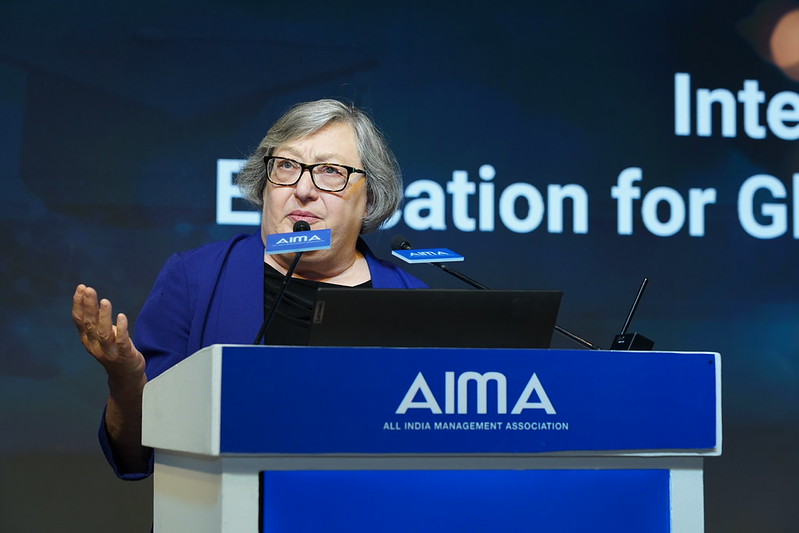
Universities must equip graduates with the right skills, values, and mindset for leadership and entrepreneurship, while advancing research and innovation, said Ms Cynthia Larive, Chancellor, University of California, UC Santa Cruz at AIMA’s 52nd National Management Convention.
As the head of a major public research university, I am often asked whether artificial intelligence will make colleges and universities redundant. My answer is no — but it will fundamentally change how we teach, learn, and lead.
Read more: Intelligence’s next frontier: Education for global transformation and resilience
At the University of California, Santa Cruz, we see AI not as a threat but as a transformative opportunity. It challenges us to rethink the purpose of higher education — not merely to transfer knowledge, but to build judgment, adaptability, and empathy in a rapidly changing world.
AI is the most disruptive force I’ve seen in my lifetime. It is reshaping research, amplifying discovery, and transforming the workforce across industries. The question is not whether AI will change education — it already has — but whether we can use it to expand human potential rather than limit it.
Our approach has been to teach with AI, not just about it. Faculty are using generative AI to create new kinds of assignments, case studies, and simulations that encourage students to think critically, analyse bias, and question machine-generated outcomes. Students engage with AI not as passive users but as collaborators, learning how to critique, correct, and improve upon what technology offers.
For instance, our computational media department teaches human-centered AI — blending technical understanding with humanistic insight. In another course, students use generative AI to “interview” historical figures, an exercise that builds both empathy and analytical rigor. Across disciplines, we’re preparing students not just for existing jobs but for jobs that don’t yet exist — and, more importantly, for uncertainty itself.
AI has also become integral to research. At UC Santa Cruz, it enables astronomers to process 60 trillion bytes of nightly data from the Vera Rubin Observatory, uncovering celestial phenomena no human eye could track. In genomics, AI is accelerating the discovery of genetic variations that cause disease, shortening the path from diagnosis to treatment. These breakthroughs are not replacing scientists — they are empowering them.
But with this power comes responsibility. Universities must ensure that innovation remains ethical, inclusive, and anchored in the public good. We are committed to scaling AI responsibly, building partnerships with industry and governments, and preparing a workforce that is not only technically fluent but also morally grounded.
Equally important is keeping education human. No algorithm can replicate the transformative experience of fieldwork, laboratory research, or artistic creation. These experiences connect knowledge with purpose — and that is where true learning happens.
As educators, our mission is evolving. We must train students to ask the questions AI cannot: Is this right? Is this fair? Is this helpful? The answers will define not just the future of higher education, but the future of humanity itself.
Watch the full session- https://www.youtube.com/watch?v=L4uhOmfEmzA



